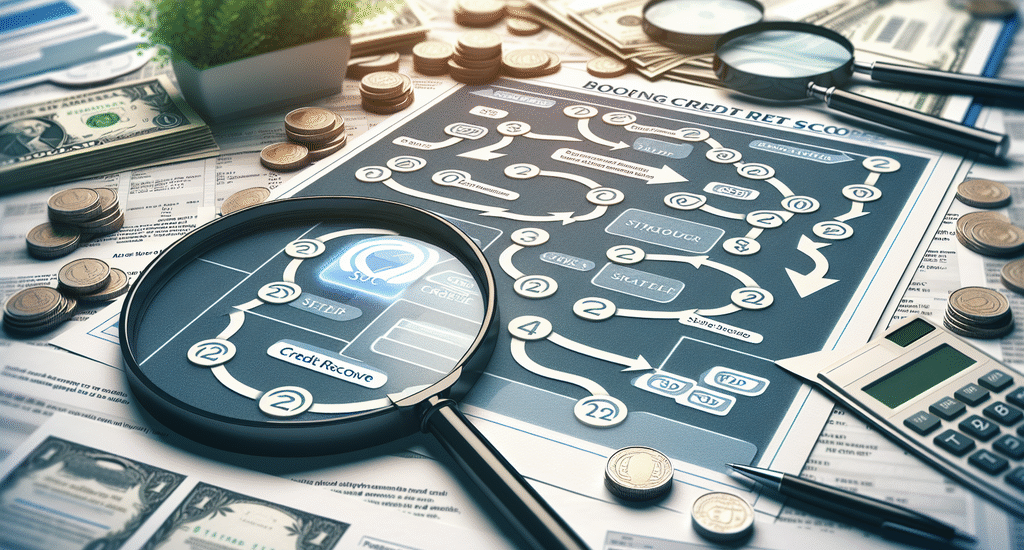- June 2, 2025
- Posted by: Financeguidehub.com
- Category: Credit Scores

Having a bad credit score can feel like a heavy weight on your financial life, impacting everything from loan approvals to rental applications. Understanding how to recover from a bad credit score is essential for regaining financial stability. By taking proactive steps and making informed choices, you can improve your credit status and open up better financial opportunities.
Understanding Your Credit Score
Your credit score is a numerical representation of your creditworthiness, typically ranging from 300 to 850. A bad credit score is usually considered anything below 580, and it can result from various factors such as missed payments, high credit utilization, or bankruptcy. To effectively recover from a bad credit score, the first step is to understand what impacts your score:
- Payment History (35%): Late payments, defaults, and bankruptcies can severely affect your credit score.
- Credit Utilization (30%): This ratio compares your credit card balances to their limits. High utilization can negatively affect your score.
- Length of Credit History (15%): A longer credit history can positively impact your score.
- Types of Credit Used (10%): A diverse mix of credit types (credit cards, loans) can benefit your score.
- Recent Inquiries (10%): Each hard inquiry can slightly lower your score.
Check Your Credit Report
The first step in recovering from a bad credit score is to obtain and review your credit report. You can access a free copy of your credit report once a year from each of the three major credit bureaus: Equifax, Experian, and TransUnion. Review your report for:
- Errors or inaccuracies
- Accounts that don’t belong to you
- Late payments or defaults you were unaware of
If you find any inaccuracies, dispute them with the credit reporting agency to ensure your report reflects accurate information.
Create a Budget and Manage Expenses
Rebuilding your credit score begins with sound financial management. Create a realistic budget that takes into account your income, debts, and essential expenses. Here are a few practical tips to get started:
- Track your monthly income and expenses to identify where you can cut back.
- Prioritize paying off existing debts and managing current expenses.
- Aim to live below your means to create surplus income, which can help pay off debts faster.
Pay Bills on Time
Your payment history is a significant component of your credit score. Setting up automatic payments or reminders can ensure you pay your bills on time. Here are a few strategies:
- Use apps or calendars to track due dates and remind yourself when payments are due.
- Consider setting up automatic payments for recurring bills.
- Communicate with creditors if you’re struggling to make payments; they may offer solutions like payment plans.
Reduce Your Credit Utilization Ratio
High credit utilization can weigh down your credit score. Aim to keep your utilization below 30% of your total credit limit. Here are ways to achieve this:
- Pay down existing credit card balances strategically, focusing on the highest-interest debts first.
- Request a credit limit increase with your existing credit cards but ensure you maintain discipline in your spending.
- Consider spreading your expenses across multiple cards to decrease the percentage of credit utilization on each account.
Consider a Secured Credit Card
If your credit score is too low to qualify for a traditional credit card, a secured credit card can be a useful tool for rebuilding credit. Here’s how to use it effectively:
- Deposit a cash sum as collateral, which typically becomes your credit limit.
- Use the card for small, recurring expenses and pay off the balance monthly to establish a positive payment history.
- Monitor your credit score as it improves with responsible usage.
Limit New Credit Inquiries
While applying for new credit can be tempting as you work to rebuild your credit, too many hard inquiries can further damage your score. To minimize this impact:
- Only apply for credit when necessary.
- Inquire about pre-qualification options that do not affect your credit score.
Seek Professional Help if Necessary
If the task of recovering from a bad credit score feels overwhelming, consider seeking help from a credit counseling service. Certified financial advisors can offer tailored advice and create a plan that suits your situation. Ensure you choose a reputable service, and avoid any agencies that promise quick fixes for your credit score.
Keep Old Accounts Open
Keeping long-standing accounts open can positively affect your credit score by increasing your length of credit history. Consider these points:
- When closing accounts, think carefully. Closing older accounts can shorten your credit history.
- Utilize old accounts occasionally to keep them active and demonstrate consistent responsible behavior.
Practice Patience and Monitor Your Progress
Recovering from a bad credit score takes time and dedication. Regularly monitor your credit report and score to track your progress. You might also notice the fruits of your efforts as time passes:
- Significant improvements in your score can occur within a few months if you follow these steps diligently.
- Keep an eye on any changes to your credit habits and adjust strategies as needed.
Improving a bad credit score is not an overnight task, but it is doable with patience and effort. By understanding your credit score, reviewing your report, making timely payments, and managing your finances responsibly, you can pave the way toward a healthier financial future.
For more insights on personal finance strategies, feel free to browse our articles on financeguidehub.com.
For further reading on credit repair strategies, you may also check out Investopedia and NerdWallet.

